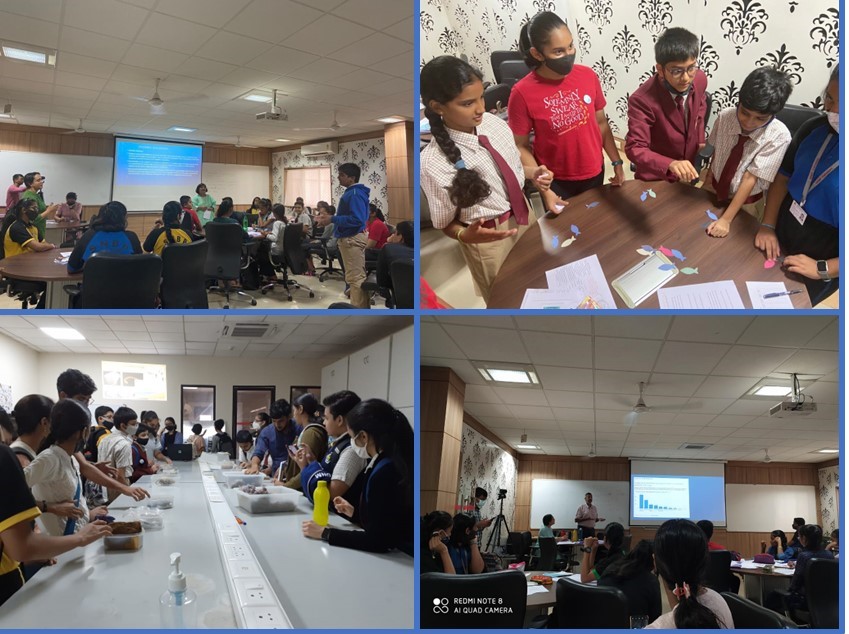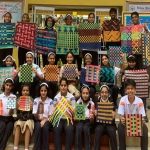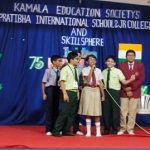
Report on Water Classrooms
Water Classrooms is a joint project of (Transforming Education for Sustainable Futures) Indian Institute of Human Settlements (IIHS), Living Waters Museum (LWM), Centre for Water Research, TESF, IISER Pune and India Indian Institute for Human Settlements, ( IIHS) in collaboration with Centre for Environmental Education (CEE) . It aims to generate interdisciplinary knowledge about water systems, including their history and heritage, resource management and sustainable use, and to train the next generation of scholars to look at water from a multi-dimensional lens. Selected nine middle school students are participating for the eight sessions to be held on different days at IISER, Pune.
Session 1 ( 3/07/2022)
The topic for the first workshop was “Water and Myself” and “Where does water come from”. The session was curated by Chhavi Mathur Project Coordinator (Living waters museum). The main objective of the workshop was to look at water from an inter disciplinary perspectives. The session started with a quick introduction of each other. Next, the students made a mind map
that showed how water affects nearly every aspect of their life from using it for personal hygiene to using it for a livelihood. They were asked to draw the origin of water on the sheets provided starting from the tap which provides them with water. They were also shown the topography of Pune and its surrounding areas with the rivers and tributaries that bring water to the city and then the students had a short discussion how human development can hamper the natural water channels.
Session 2 (10/07/2022)
The topic for the workshop was “Values, practices, roles and responsibilities toward our Shared Waters”. The founder-director, Dr Sara Ahmed (Living waters museum) engaged students in activities and conversations around water values, cultural practices and water as a human right – access, caste, poverty. The students were then told a story titled “Paani Party” which helped them understand why water is a magical resource and how useful it is. Through the activity “Water for All”, the students learnt that not all children are privileged. Many have to stand in long queues to get water. They get very little water, suffer from diseases like diarrhea, and help in household chores thus missing their school while some get adequate supply of water, go to a decent school and have a good economic status. This helped them understand the value of water.
Session 3 (17/07/2022)
The topic for the workshop was “Water in my daily life and my community”. The session was started off with understanding gender stereotypes and water. Dr Sara Ahmed focused on the difference between ‘gender and sex’ and ‘gender equality and equity’. The students were also told how women and men toil hard to get water in rural and urban areas alike. The topic of grey water, green water and blue water was also touched upon. The students were then distributed in groups of 5 were given a setting (rural/urban) and given a topic of water shortage to discuss upon and had to enact a role play on it. It helped the students the importance of water. The students also got to know that clean water is a human right and everyone deserves it. They also got to
know a little information on SDG-6 i.e., ‘Clean water and sanitation’.
All were very lively workshop and the topics were explained in great detail. The students got the opportunity to interact with students from various schools. are eagerly looking forward to attend the next Water classroom workshop!
Session 4 ( 7/08/2022)
The topic for the workshop was " Management of water and water-related disasters”. The workshop had students from various schools. The session started off with understanding classification of water sources as rural and urban, formal and informal, traditional, etc.
To understand the depleting aquatic life, they played a short game of fishing which made us understand that if we use natural resources (fishes in this case) carefully and give them time to replenish they will thrive for a longer time. That is fish as per need not for greed. Students enlisted various disasters and learnt how to differentiate between hazards and disasters. Then
they explored the effects of floods on lives in Pune through audio narratives.
Then, the students were briefed upon water pollution in Ganesh festival and how can we reduce it. They were told that even if we use Shadu clay it is a natural resource and it may deplete. The students were then told about a foundation called ‘Punaravartan’ which collects Shadu clay and gives it to artisans.
Session 5 (14/08/2022)
The topic for the workshop was ”Water and Power (generation) and Wastewater”. The students were asked to name a few types of energy (Solar energy, Hydroelectricity, Tidal power, etc.). Then the working of these energy models was discussed in detail and the students also understood about the working of turbines with working models of 4 different types of turbines. The topic of AC and DC current was also touched upon.
Then they had a short discussion on the positive and harmful effects of a dam. The students learned about trans-boundary conflicts (related to water) and how the usage of water upstream affects the water downstream. They also did a case study on the river ‘Teesta’.
They also discussed about wastewater and how it is treated. They also wrote a letter to the municipal commissioner about the wastewater issues in our city.
Session 6 (21/08/2022)
The session started of with the recap of the previous session. The students were then asked to write their views on climate. They learnt about the factors that influence climate. They learnt about the water cycle, vegetation cycle, etc. The students learnt about stocks and flows.
They then met two scientists. They were told the relationship between paleontology and climate with respect to water. They also got to see a variety of fossils. They then learnt about dendrochronology and dendroclimatology. They also got to know how the age of a tree is measured and how climate change can be observed by studying tree rings.
Session 7 (28/08/2022)
The topic of the session was “Water in Agriculture”. The session focussed on student’s understanding of the complex world of agricultural practices and water usage in the same. They came to know about crops sown in different cropping seasons and water sources associated with them. Through an activity they learned how water requirement changes according to the soil type. They discussed the possible solutions that can come through community management- examples of Ralegaon Siddhi and Hiware Bazar.
Students have already started thinking about their water footprints and how their choices can change the water usage patterns in the agriculture sector.
All workshop were lively and the topics were explained in great detail. The students got the opportunity to interact with various Scientists and students from various schools.
https://www.livingwatersmuseum.org/
https://www.ceeindia.org/
https://tesfindia.iihs.co.in/04_development-of-water-classrooms/




